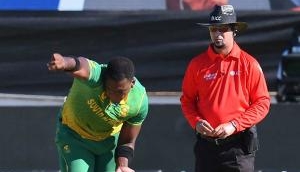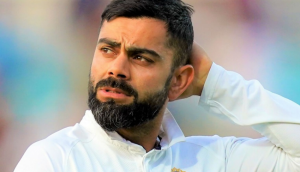IPL games can be shifted. But it's BCCI's attitude that needs a paradigm shift

- On Wednesday, 13 April, the Bombay High Court ordered 13 IPL matches to be shifted out of Maharashtra
- The court has allowed six April games in the drought-hit state to go ahead as planned
- It won\'t be too big a problem to shift the games. After all, the 2009 IPL and half of the 2014 IPL were moved abroad
- However, it remains to be seen if the order can bridge the gap between the BCCI and society at large
- Will the petitioner NGO appeal against the April games? Will the BCCI appeal to SC?
- What could the BCCI have done to avert this?
You don't even have to strain your ears to hear the 'serves the arrogant BCCI right' chorus. For a couple of years now, the Board of Control for Cricket in India (BCCI) has been everybody's favourite whipping boy, mostly with plenty of reason. On Wednesday, it was again at the receiving end of a Bombay High Court order.
At the moment, the traumatised BCCI is in no position to say that shifting the games is a logistical nightmare for the Indian Premier League (IPL) Governing Council: not at a time when the venues for the Gujarat Lions' home games against Kolkata Knight Riders (19 May) and Mumbai Indians (21 May) are yet to be finalised.
However, the High Court decision does present the BCCI/IPL with a serious challenge.
The logistics of shifting
Of course, the BCCI and the IPL have the wherewithal to conduct matches at different venues, as shown in 2009 and 2014.
The second edition of the tournament was moved bag and baggage to South Africa because several state governments said they could not provide security due to the general elections. For a similar reason, the BCCI organised the first half of the 2014 event in the UAE.
Yet, it is one thing to move either a full tournament or even half of it to a location outside India, and altogether another to shift 13 matches away from their scheduled venues.
There are a number of issues to be taken into account when rescheduling games: the availability of flights, and hotel accommodation for players, support staff and officials. There is also the ease with which the broadcasters can move equipment and personnel.
More importantly, the BCCI will have to find venues that have not slipped into maintenance mode after the domestic season.
Will any of the cricket grounds stop using water because IPL matches have been ordered away? Unlikely, because the maintenance of a cricket ground is a year-round process. For a first-class venue to be ready to stage games in September, pitch and outfield preparation cannot wait for the monsoon.
May is the cruelest month, but not April?
There is one other question that comes up, though. If the conditions are bad enough for the games scheduled in May to be shifted out of Maharashtra, are the conditions alright for the six games due this month, which have been granted exemption by the court?
It is curious that the Maharashtra state government was not first approached to see if the IPL games should be moved to other locations.
It is even more curious that the first signs of the IPL being pitted against the farmers surfaced only at the beginning of the month, when the Mumbai BJP wrote to BCCI president Shashank Manohar.
It will be interesting to see if the NGO that went to court against the matches will now appeal to the Supreme Court and ask for the April games to be moved as well.
If it doesn't, you can be sure that it did not really think too much about the farmers, let alone about finding a long-term solution for the water-starved folk in the Vidarbha and Marathwada regions.
What you can be fairly sure about is the BCCI deciding against approaching the Supreme Court for any relief. The last time a Board chief challenged a Bombay High Court order, cricket administration came under massive scrutiny by the Supreme Court and the two key committees it appointed, headed by Justice (retd) Mukul Mudgal and Justice (retd) RM Lodha.
Cricket is not played in a vacuum
The BCCI could have averted this by showing itself as socially responsible in the following two ways:
1. Facing a severe crisis of credibility, especially in the courts of law, it should never have allotted any games to Nagpur (but for the fact that it is the Board president's hometown).
2. Then, it could have announced a Rs 100 crore donation to drought relief rather than have IPL chairman Rajeev Shukla make polite noises about adopting a couple of villages.
At a time when the Mumbai Indians and the new franchise, Rising Pune Supergiants, offered to contribute Rs 5 crore each towards the Chief Minister's Relief Fund, the BCCI did not even make a matching offer.
It must be this attitude that would have convinced the Bombay High Court that the Board and its commercial offspring did not deserve its sympathy.
Former India captain Bishan Singh Bedi recalls a time when cricket grounds across England chose to water only their respective squares (consisting of a number of pitches), and let their outfields be barren.
The Mumbai Cricket Association, Maharashtra Cricket Association (Pune) and Vidarbha Cricket Association (Nagpur) could easily have offered to replicate that this IPL season.
There is a huge lesson in this for the BCCI: it has to work really hard to recover lost ground. Quite clearly, the Board's mandarins have not read CLR James' seminal work, /Beyond a Boundary/, where he says that cricket is not played in a vacuum but in a society.
For far too long, the BCCI has not looked around to see what it can do to improve the society in which the sport is played.
The farmers' IPL
When I think of what cricket means to many Indians, I find it tough not to recall a colleague's narration of his coverage of a cyclone in Orissa in 1999. Using a motorboat to negotiate his journey from village to village, he chanced upon a man on a tree in a marooned village.
Clearly, barring a steel trunk that he clutched under an arm, the man had lost all his belongings to the devastation.
Yet, as he waited for help to arrive, the villager kept his thoughts away from his misery by tuning in to All India Radio's commentary of an India-New Zealand game.
It is a good guess that many a farmer - whether he has migrated from his village to a city in search of sustenance or has chosen to stay back in the hope of a better time ahead - may tune in to the IPL each night this season. Indeed, we will have reason to remember IPL 2016 as the 'Farmers' IPL'.
But now, having got the court to order the moving of the IPL games away from Maharashtra at its 27,723 drought-hit villages, will those who moved the application take the next step and ensure that the farmers' woes in Vidarbha and Marathwada are alleviated? Or were they only out to teach BCCI a lesson or three?
Hopefully, this order will not be the end of the focus on the conditions in the state. I hope everyone concerned will find ways in which to ensure that remedial measures are put in place to tackle drought now, and every time in the future.
First published: 14 April 2016, 12:00 IST





![BJP's Kapil Mishra recreates Shankar Mahadevan’s ‘Breathless’ song to highlight Delhi pollution [WATCH] BJP's Kapil Mishra recreates Shankar Mahadevan’s ‘Breathless’ song to highlight Delhi pollution [WATCH]](https://images.catchnews.com/upload/2022/11/03/kapil-mishra_240884_300x172.png)

![Anupam Kher shares pictures of his toned body on 67th birthday [MUST SEE] Anupam Kher shares pictures of his toned body on 67th birthday [MUST SEE]](https://images.catchnews.com/upload/2022/03/07/Anupam_kher_231145_300x172.jpg)






